Friday, September 6th 2019

Intel Sourgrapes AMD's Creator Performance Leadership with Laughably Dubious Data
Intel as part of its IFA Berlin client-segment presentation resorted to some very juvenile marketing tactics, inviting criticism from noted PC enthusiast Der8auer. Intel scampered to reclaim its market position in the PC gaming space with the announcement of the Core i9-9900KS 8-core processor, which armed with a 5.00 GHz all-core Turbo Boost frequency, is expected to cement the company's gaming performance leadership. The company didn't leave it at that, and went on to attack AMD's creator performance leadership.
Der8auer observed something curious about a few slides in particular that Intel used to discredit AMD's high-end desktop processors, relating to its Creator performance as tested in Maxon Cinema 4D's benchmark program, Cinebench. Intel claimed that AMD cannot use Cinebench data to represent "real-world" performance as "only 0.22 percent" of users polled by Intel's "Software Improvement Program" respondents use Maxon Cinema 4D. And who are these respondents? Close to 11 million of them, _all_ of whom are notebook and tablet users, and a majority of whom have Software Improvement Program part of OEM bloatware. This, according to Der8auer, is fundamentally dishonest on Intel's part as Maxon Cinema 4D is less likely to be used on portable computers, and more likely on premium desktops or HEDTs. You can watch Der8auer's vlog here (English) or here (German).The complete slide-deck follows.
Der8auer observed something curious about a few slides in particular that Intel used to discredit AMD's high-end desktop processors, relating to its Creator performance as tested in Maxon Cinema 4D's benchmark program, Cinebench. Intel claimed that AMD cannot use Cinebench data to represent "real-world" performance as "only 0.22 percent" of users polled by Intel's "Software Improvement Program" respondents use Maxon Cinema 4D. And who are these respondents? Close to 11 million of them, _all_ of whom are notebook and tablet users, and a majority of whom have Software Improvement Program part of OEM bloatware. This, according to Der8auer, is fundamentally dishonest on Intel's part as Maxon Cinema 4D is less likely to be used on portable computers, and more likely on premium desktops or HEDTs. You can watch Der8auer's vlog here (English) or here (German).The complete slide-deck follows.


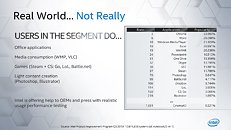





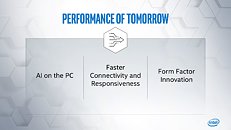

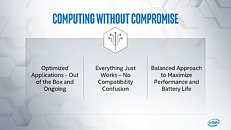


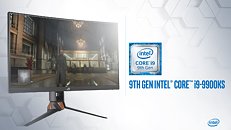



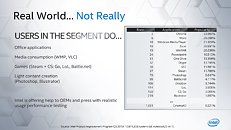


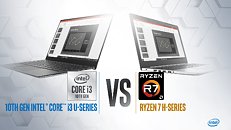
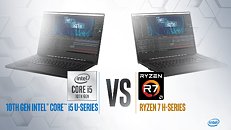
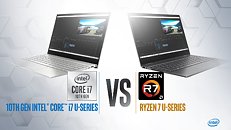
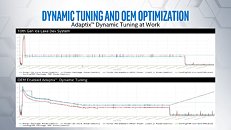
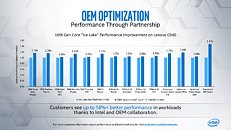
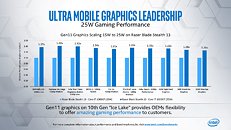

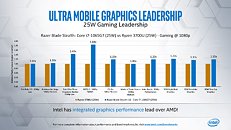

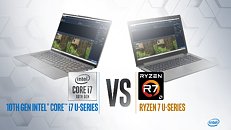

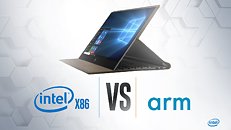






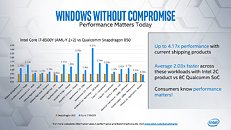
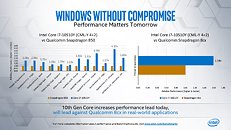
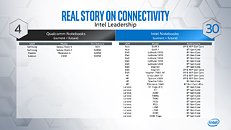

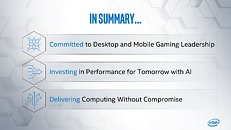

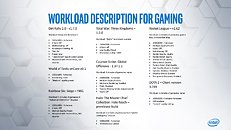



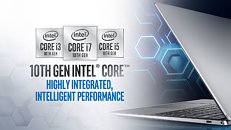
90 Comments on Intel Sourgrapes AMD's Creator Performance Leadership with Laughably Dubious Data
All looking at the pictures of the persons shown. I hope they asked them for permission. Not like der 8auer, who they didn't ask for the slides. Not that he minds it. But it would have been nice to ask :)
And what does a CPU have to do with VPN devices? Who came up with that?
Knowing that English is not my mother tongue, and I am dyslectic, so something could have been lost in translation, but where does connectivity equal to design wins? Unless they are bragging about their connections to the OEM industry? (this slide)If I understand the slides correctly, it’s the part that installing a native x86 application on an ARM based laptop can be difficult. Which actually is true. The sad thing is that is the most truthful part of the presentation.
We are now finally in the position where both AMD and Intel have solid offerings in the desktop segment. Not that long ago, Intel used to be best in "everything", and many of you think that Zen 2 now is ruling everything in a similar fashion, but that's not the case. Luckily, both are good enough in most scenarios that neither will be a bad choice, but people should try to pick the best option for their requirements and budget. Zen 2 have fortunately come "close enough" in gaming performance to where it's good enough for most, but if you're buying a pure gaming PC you should still buy the best option in that price range, which currently would be Intel (*except for local discounts). Many users also do things like Photoshop and gaming, which would still be areas where Intel have an advantage. But for those who value energy efficiency, or heavily rely on Blender rendering, Cinema4D, or other applications where AMD have a clear advantage, then Zen 2 should be the obvious choice.Get educated, that's not even remotely true.
Intel have had a brand new architecture ready for two years now, just waiting for a suitable node to produce it, and they are also preparing the next one for 2021.
Intel have not been "pissing their pants", been relaxing or whatever. Their fault is in building a strategy where everything relies on a single node being on time, and not having any kind of real "backup plan".
/Seespcperwebsiteref
Oh right...
So now I'm literally stuck on this 4 year old workstation with no upgrade path. Going to 8700k, 9700k, 9900k, just aren't worth the investment right now, even if I could sell it to management.
But I couldn’t say as I’m in the middle of moving so my PC is put away right now
Not bashing Intel since all companies do it but they sure seem desperate.
Beyond that, you guys need to look at those two slides with the percentages on them. These slides are about their MAINSTREAM DESKTOP lineup. Look at the asterisked text there, their data is from the Intel Customer Improvement Program, which is an app that needs to be installed on your machine that datamines your usage. Now, that's bad enough, but look where the data is coming from. EXCLUSIVELY Notebooks and All-In-Ones. i.e. NOT the target market for any of these apps, really.
People seem to be forgetting; It's just marketing. It's no different than anyone else's marketing and world is not going to stop spinning just because it's Intel(or AMD...or Apple...or NVidia...etc, etc, etc...).
The money spend on Jim Keller was worth every penny.
I also have friends that work for AMD, and they complain about what complete sh*t show it is over there.
They have amazing engineers, and Lisa has excellent vision for where they're going, but execution is one of their weakest attributes.